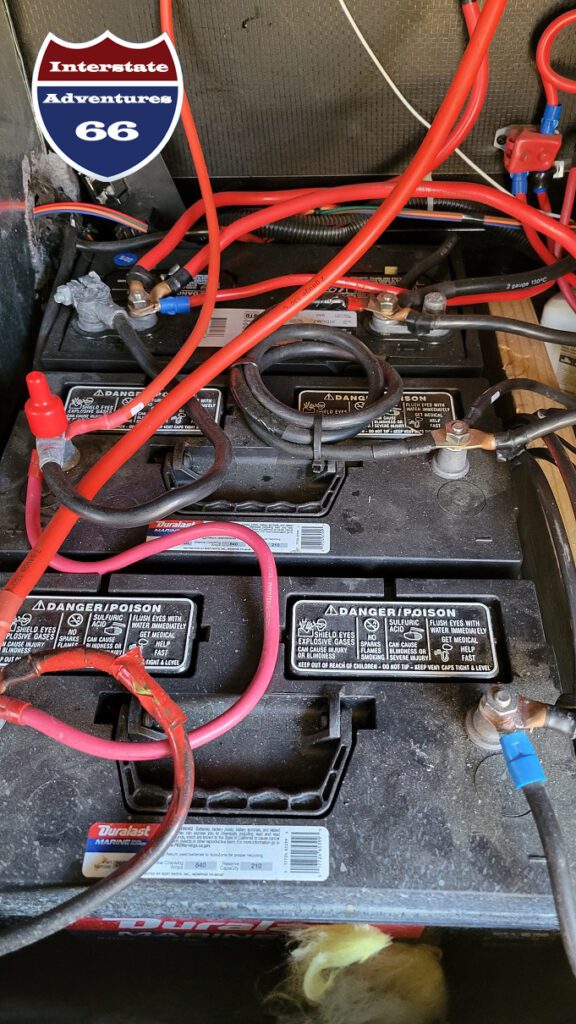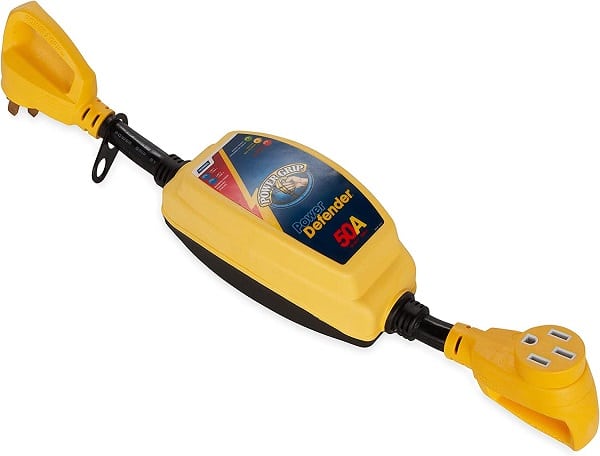If you’re anything like me, your understanding of electricity is that you flip a switch and the lights turn on. Did you know there are 2 RV Electric Systems to make everything run? I certainly didn’t. But when we moved into the RV, the need to know became that much greater. Especially since we intended to do a lot of boondocking.
Doug has had the patience of a saint over the years trying to explain to me the basics of how electricity works. Listen, I knew enough to ace the test in middle school science class, including our little lab making the lightbulb turn on. And at the time I had the formula W = A x V memorized. But this was never a formula I needed in life. Off it went to the storage cabinet marked “Useless Information” in my brain. Great for Jeopardy. Not for real life.
Never did I think I would be opening that filing cabinet to pull the ELECTRICITY folder out. But guess what, here I am! Not only pulling that folder out, but having a very basic understanding of that stuff lightning bolts produce. Enough to even put together an article for all of you to boot! Don’t worry – Doug proofread to make sure I explained everything right.
Enough about me, back to the RV.


2 RV Electric Systems
Unlike your house, your RV has 2 electric systems. There is the system that runs off of the batteries. The batteries are a 12-volt DC electric system. Your house doesn’t have batteries. And then a second system that runs off of your shore power. The shore power is a 120-volt AC system.
Way back in kindergarten we learned that 120 is bigger than 12. So you guessed it, your bigger appliances require the Shore Power to turn on. There’s a lot more too it than that, but it’s an easy place to start. Particularly because I needed electric for dummies, and maybe you do too… Who knows. I’m not judging. That’s where I am too.
But who does what? Can you plug your phone into an outlet to charge without being connected to shore power? Will your refrigerator or air conditioner work? Will the lights even turn on? I didn’t used to know, but now I do! And so can you. I’m not promising ease of learning here though. That part’s on you, and frankly, it took me to live in a camper to grasp all of Doug’s lessons.
12-Volt Battery System
Lets start with the little system. And the more important one. Your RV Batteries! There are several ways to configure your batteries, and even more types of batteries you can have for your RV. But that’s not what this article is about. In Doug’s article about RV SOLAR PANELS he goes into detail about the different types of batteries. Check that out for those details.

Your RV Batteries are in charge of the critical components of your RV. What’s critical then? Think about your car for a minute. It runs on a battery. If you turn your key to accessories the car wont run, but your lights will come on. Maybe you’ll have the radio for a few minutes. But the car itself can’t drive down the road. Same thing for your RV.
Your lights will work. So will your water pump (once you turn it on). Your furnace and water heater will fire up, and your carbon monoxide detector will work. If you have an RV refrigerator, that will be running too. If your RV is equipped with a residential fridge, it will run, but with the assistance of an inverter. Which is another component to the whole electricity equation that I’m still figuring out. All of these things are “critical” components. So no outlets, fireplaces, or air conditioners.
I’ll go over keeping your batteries charged in a little bit.
120-Volt Shore Power System
In order for the outlets, your fireplace, or your air conditioners to work, you need shore power. Most commonly, we think of shore power as a pedestal at the campground. All of our RV’s came with a power cord. Now a days that will either be a 30-Amp or a 50-Amp cord. (30-Amp has 3 prongs and 50-Amp has 4 prongs) Once you plug your camper into the pedestal, you can use the outlets in your camper.

Think of the shore power as your creature comforts. It’s nice to have air conditioning, but not necessary. It’s also great to plug the coffee pot in, but not really a necessity. Same goes for the TV. It isn’t going to work without shore power. Think about it, it needs to be plugged into an outlet to work, and your outlets aren’t working without the shore power.
Check Out These Great Deals On Amazon!
If you’re boondocking, dry camping, or at a campground without hookup’s, you can get shore power from a generator. So not all shore power needs to come from a pedestal, but it does need to come from an outside source. We recommend always using an RV surge protector whenever your camper is plugged in. See the one we use below.

All Batteries Go To Heaven
Just like in your little tikes favorite noisy toy, the batteries in your RV won’t stay charged forever. Eventually they will die and go to Battery Heaven. And, just like little Suzie’s toy, the more you use the battery, the faster it (they) will be headed there.
If your camper is parked in your driveway with the heater set to come on at 65* and it isn’t plugged in anywhere, you’re draining your batteries. Just like if you left the interior lights on in the car overnight. Remember, the batteries handle the critical stuff. Your carbon monoxide detector is always on drawing power. The furnace is kicking on, and then the fan to push the air is yanking at those batteries too. Not to mention the fridge and any lights you kept on. Left on their own, batteries will continue to do their job until they can’t. No battery has an infinite lifespan.
So you’re boondocking for the first time. You think the house battery the dealership provided you with should stay charged long enough to make it through the night with all of the critical systems tugging away at it. Guess what, you thought wrong. And so did we. Here is our YouTube Video exhibiting our mistake.
Batteries need to be charged.
RV Electric Systems Crossover Alert!
Oh My! Just when you thought you had a handle on what system was doing what, I’m gonna scramble it up a bit. When you plug your RV into shore power, it charges your batteries.
WHAT?! Yeah…
That’s how it works. Otherwise, you would have to keep replacing all of your heavenly batteries. And in case you didn’t know, they aren’t cheap, and they die pretty quickly when you don’t charge them. When we’re boondocking, we utilize our solar system to charge the batteries during the day, so they stay charged overnight. We also have a generator for when there is a lot of tree cover or bad weather.

Rent Your RV Out or Find One To Rent!
Alright, another change-up here. Your RV may already have come equipped with an inverter. If it didn’t, I would highly recommend getting one. What an inverter does is convert DC power (your battery bank) into AC power (your shore power). So bringing that down as simply as possible… It allows you to use some of your creature comforts even when only running off of your battery power.

RV Electric Finale
First and foremost, don’t go messing around with electrical things unless you’re a professional or have a serious understanding of what you’re doing. I will never be the person deciding what can be plugged into the inverter. Doug isn’t an Electrician, but he knows what he’s doing. I used to call him a “Jack of All Trades,” but the rest of that phrase is “- Master of None.” And well, that isn’t quite right because he seems to master everything he does. If I call him a “Master of All Things” his head will get too big. We live in a camper. There’s no room for that.
When using an RV you need to understand that there are 2 separate electrical systems working in tandem to make your camping experience marvelous. Knowing which system is doing what will help you expand that experience and allow you to do more off grid camping in spectacular locations.

Rent Your RV Out or Find One To Rent!
I’d like to do a follow up article on Choosing the Right Generator which will tie into this one quite a bit. So look out for that one coming soon. In the meantime, drop us a line and let us know where your next Interstate Adventure is!